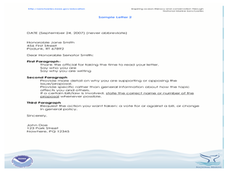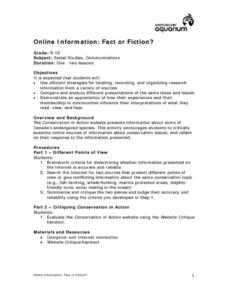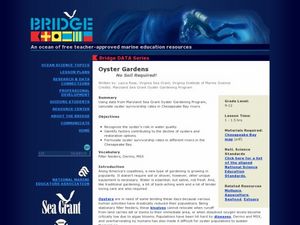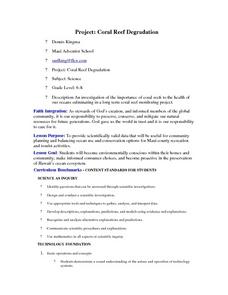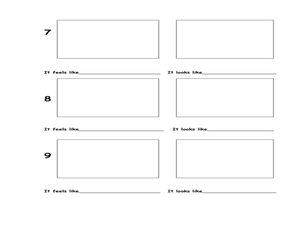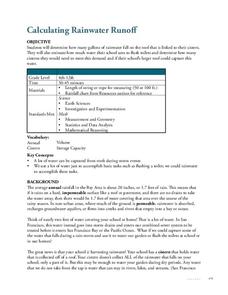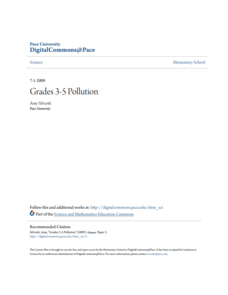Curated OER
Turning the Tide on Trash: Marine Debris Curriculum
Seven pages of fascinating reading on marine debris preface the activities in this lesson plan. Four different activities are employed to simulate how the debris is distributed in the ocean and along beaches. Early ecology learners...
Curated OER
In My Opinion
Young writers craft letters to the government stating their opinion on different topics. They pick an environmental or ocean issue, research it, and craft their formal persuasive letter. Ensure your learners include supporting facts and...
Curated OER
Oil on the Beach
Students explore how oil pollutes the oceans. In this science lesson, students investigate various materials that could be used to clean up an oil spill. Students discuss which materials worked best and how humans can reduce oil spills.
Curated OER
To Fish or Not to Fish?
Students demonstrate the decision-making process for marine reserves designations. In this role-playing lesson students analyze maps and data relating to a proposed reserve. They formulate the best decisions based on overall issues.
Curated OER
Online Information: Fact or Fiction
Discuss ways to determine if the information middle and high schoolers gather online is accurate. Using the Internet, they cite two sources that show conflicting points of view on a subtopic of conservation. They summarize and analyze...
LABScI
Freezing Point Depression: Why Don’t Oceans Freeze?
Can you go ice fishing in the ocean? Learners examine the freezing point of different saltwater solutions. Each solution has a different concentration of salt. By comparing the freezing points graphically, they make conclusions...
Curated OER
Endangered Marine Turtles
Students work in groups and experience what it is like to be a hatchling marine turtle by playing a board game. In this endangered marine turtles lesson, students research the threats to marine turtle hatchlings. Students then...
Curated OER
Earth's Water
If the majority of our planet is covered with water, why do we need to bother conserving it? With a thorough and varied investigation into the location and types of water on the earth, learners will gain an understanding of why this...
Curated OER
Oyster Gardens - No Soil Required!
Explore the practice of oyster gardening. Because oysters play a vital role in marine ecosystems and their populations have declined, biologists are transplanting oyster seed to repopulate reefs. After learning about this practice,...
Curated OER
Coarl Reef Degradation
Middle schoolers explore methods of preserving Hawaii's ocean ecosystem. Using underwater cameras, students take pictures of the underwater reef. They perform activities to determine the history and degradation of the coal reef. While...
Oceanic Research Group
Heat Transfer and Cooling
Astronauts train underwater to simulate the change in gravity. An out-of-this-world unit includes three hands-on activities, one teacher demonstration, and a discussion related to some of the challenges astronauts face. Scholars apply...
Global Oneness Project
Living with Less Water
Did you know that California produces two thirds of the fruits and nuts consumed in the United States? That it produces almost one third of the vegetables? Did you know that scientists warn that California is facing the onset of a...
Curated OER
Iron Fertilization - Pumping Iron
The theory that adding iron to ocean water may increase phytoplankton ability to remove carbon dioxide from the atmosphere is examined. The Monterey Bay Aquarium Research Institute is monitoring conditions off the California coast to...
Curated OER
A World in a Grain of Sand
Students go exploring Britain's beaches. In this geography lesson, students visit selected websites to learn about specific beach habitats and the history of cleaning those beaches.
NOAA
Marine Policy
Save the oceans! The 22nd installment of a 23-part NOAA Enrichment in Marine sciences and Oceanography (NEMO) program focuses on laws and marine policy. Pupils take part in an activity investigating fisheries stock data.
Marine Institute
Water Pollution
Sixth graders investigate the various types of pollutants found in water and ways to help prevent water pollution. Through a hands-on experiment, learners create samples of polluted water by mixing water with vegetable oil, dirt,...
Curated OER
See Turtles Nest! See Turtles Hatch!
Learners graph data of sea turtles hatching rates from Watamu/Malindi Marine National Park and Reserve in Kenya. In this math lesson, students use real life science data to calculate mean and median values. Learners use...
Curated OER
Exploring Marine Objects
Students identify the sources of water on Earth. In this life science lesson, students list the different plants and animals that live in the ocean. They explore marine objects in the lab and draw them.
Curated OER
Weather Anomalies
Ninth graders participate in a simulation of a select scientific team from the National Oceanic and Atmospheric Administration (NOAA).
Curated OER
America's Underwater Treasures Viewing Guide
Students complete a worksheet while watching a video about how humans affect the ocean environment. They discover the need for a practice of balancing fisheries and their fishing practices. They examine how scientists use data to help...
Curated OER
Introduction to Coral Reefs
Young scholars identify locations of coral reefs, both in the water and around the globe, identify relative depth of corals in the ocean by observing behavior of cold and warm saltwater, and create models of coral reefs.
Curated OER
Water Works Wonders
Students examine where water is found in the world, how we use it, and the various forms it takes. They observe the refraction of light through a prism, record the day and night sky over a week's time, and create a topographic model of...
Techbridge Curriculum
Calculating Rainwater Runoff
Thirsty plants soak up every bit of a rainfall, but what happens to the rain that hits the roof? Calculate the amount of rainwater from your school's roof with an Earth science activity, which brings measurement skills, observation...
Pace University
Pollution
Over the course of 10 days, scholars take a pre-assessment to place them in one of three leveled groups. Whole-class and in small groups, pupils take part in read-alouds, field trips, hands-on activities, and complete learning contracts...

